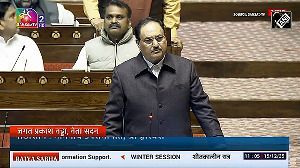Eminent nuclear scientists have issued an appeal to India's parliamentarians, asking them to insist on the ground rules for the Indo-US nuclear deal at this stage itself, since they believe the deal, in the form approved by the US House of Representatives, infringes on India's independence for carrying out research and development in nuclear science and technology.
The nuclear scientists -- Dr H N Sethna, former chairman, Atomic Energy Commission; Dr M R Srinivasan, former chairman, Atomic Energy Commission; Dr P K Iyengar, former chairman, Atomic Energy Commission; Dr A Gopalakrishnan, former chairman, Atomic Energy Regulatory Board; Dr S L Kati, former managing director, Nuclear Power Corporation; Dr A N Prasad, former director, Bhabha Atomic Research Centre; Placid Rodriguez, former director of the Indira Gandhi Centre for Atomic Research and Dr Y S R Prasad, former chairman & managing director, Nuclear Power Corporation -- said in their appeal that the representatives in Parliament need to ensure that decisions taken today do not inhibit our future ability to develop and pursue nuclear technologies for the benefit of the nation.
This is the text of their appeal:
While the nation and Parliament discuss the Indo-US nuclear deal from various angles, we feel it is our responsibility to place before the nation our well-considered views on the impact of this deal on the future of Indian nuclear science and technology, and its effects on the energy security of the nation. We have all worked in the field of atomic energy from the very early years after India's independence. From very small beginnings, we have now reached a stage where we are in possession of all the technologies needed for the production of electricity from indigenous nuclear minerals, and have successfully applied these technologies in diverse sectors from health, agriculture and industry to national and energy security. All this has been possible with the support of the people represented in the government through Parliament, and the outstanding statesmen who have guided and supported our plans.
We therefore feel it is our obligation to make public our perceptions for the effective and continued nurturing and utilisation of this technology in the country. Science is universal. Knowledge can be created in any part of the world, and technology comes with experimentation and the willingness to take risks. We have followed all these paths to reach the present stage of development. We are amongst the most advanced countries in the technology of fast-breeder reactors, which is crucial to the future of our energy security. Along the way we have derived benefits from international collaboration. At the same time, we have also shared some of our abilities in this field with the world. Indian scientists have been ambassadors, with knowledge and creativity as their tools. It is of prime importance to uphold these cherished traditions.
It is significant that the most advanced country in nuclear science and technology has come forward to accept us into the international nuclear community, by the historic document signed by our Prime Minister with President Bush on July 18, 2005. The basic principles for cooperation were well laid out in this bilateral understanding and the prime minister has appraised our Parliament of this. No doubt it needs the concurrence of the other nations comprising the Nuclear Suppliers Group, and of the International Atomic Energy Agency.
Based on this agreement, the US lawmakers and the administration are in the process of re-framing their laws, which could change the nature of relations between the two countries. This is a most welcome initiative of the United Progressive Alliance government, and is a continuation of the process essentially begun during the previous National Democratic Alliance government. Thus, there is no question of any political partisanship on this matter.
However, the lawmakers of the US Congress have modified, both in letter and spirit, the implementation of such an agreement. At this juncture, among other aspects, it is essential that we insist on the following four central themes:
India should continue to be able to hold on to her nuclear option as a strategic requirement in the real world that we live in, and in the ever-changing complexity of the international political system. This means that we cannot accede to any restraint in perpetuity on our freedom of action. We have not done this for the last 40 years after the Non-Proliferation Treaty came into being, and there is no reason why we should succumb to this now. Universal nuclear disarmament must be our ultimate aim, and until we see the light at the end of the tunnel on this important issue, we cannot accept any agreement in perpetuity.
After 1974, when the major powers discontinued cooperation with us, we have built up our capability in many sensitive technological areas, which need not and should not now be subjected to external control. Safeguards are understandable where external assistance for nuclear materials or technologies are involved. We have agreed to this before, and we can continue to agree to this in the future too, but strictly restricted to those facilities and materials imported from external sources.
We find that the Indo-US deal, in the form approved by the US House of Representatives, infringes on our independence for carrying out indigenous research and development in nuclear science and technology. Our R&D should not be hampered by external supervision or control, or by the need to satisfy any international body. Research and technology development are the sovereign rights of any nation. This is especially true when they concern strategic national defence and energy self-sufficiency.
While the sequence of actions to implement the cooperation could be left for discussion between the two governments, the basic principles on which such actions will rest is the right of Parliament and the people to decide. The prime minister has already taken up with President George Bush the issue of the new clauses recommended by the US House of Representatives. If the US Congress, in its wisdom, passes the bill in its present form, the 'product' will become unacceptable to India, and, diplomatically, it will be very difficult to change it later. Hence it is important for our Parliament to work out, and insist on, the ground rules for the nuclear deal, at this stage itself.
We therefore request you, the Parliamentarians, to discuss this deal and arrive at a unanimous decision, recognizing the fundamental facts of India's indigenous nuclear science and technology achievements to date, the efforts made to overcome the unfair restrictions placed on us and the imaginative policies and planning enunciated and followed in the years after Independence. The nation, at this critical juncture, depends on its representatives in Parliament to ensure that decisions taken today do not inhibit our future ability to develop and pursue nuclear technologies for the benefit of the nation.
Dr H N Sethna, former chairman, Atomic Energy Commission
Dr M R Srinivasan, former chairman, Atomic Energy Commission
Dr P K Iyengar, former chairman, Atomic Energy Commission
Dr A Gopalakrishnan, former chairman, Atomic Energy Regulatory Board
Dr S L Kati, former managing director, Nuclear Power Corporation
Dr A N Prasad, former director, Bhabha Atomic Research Centre and Dr Y S R Prasad, former chairman & managing director, Nuclear Power Corporation




